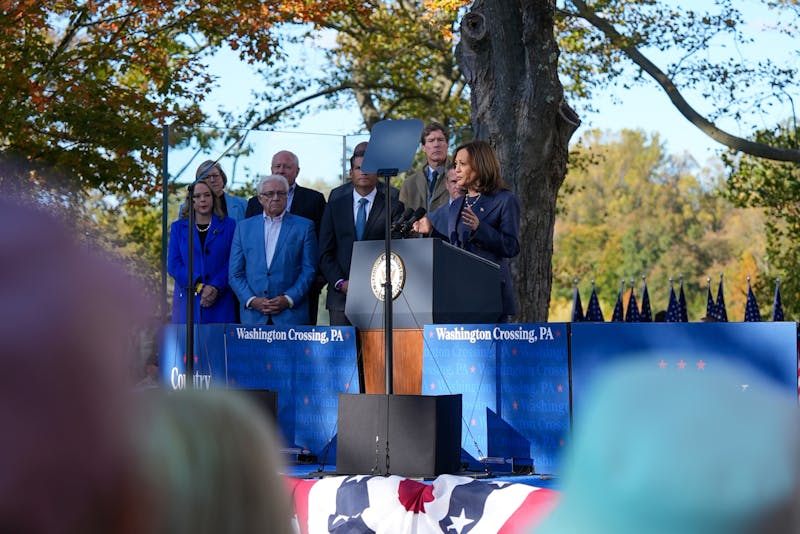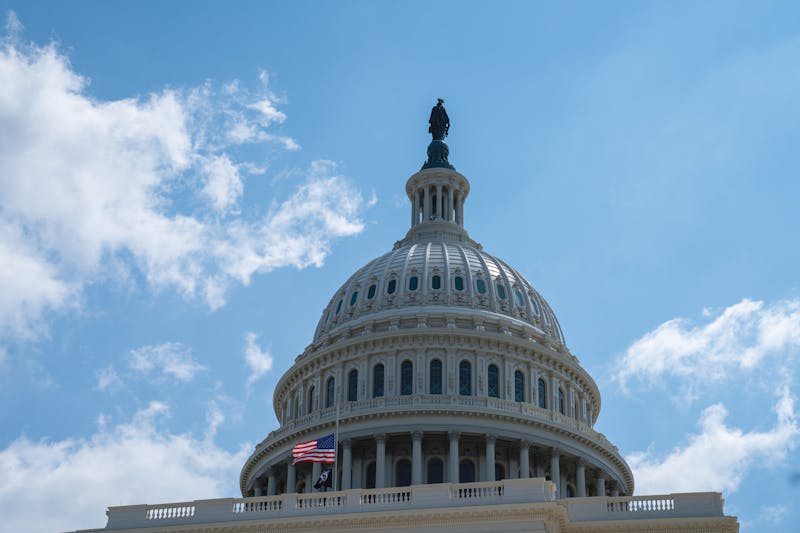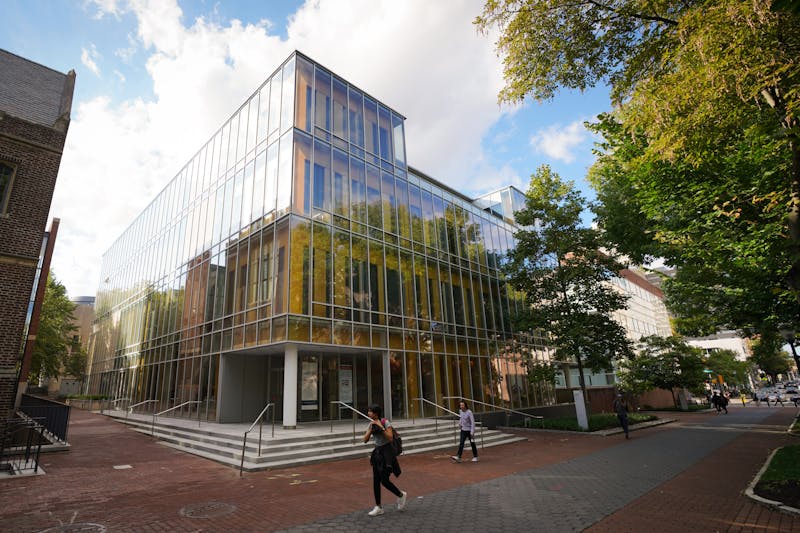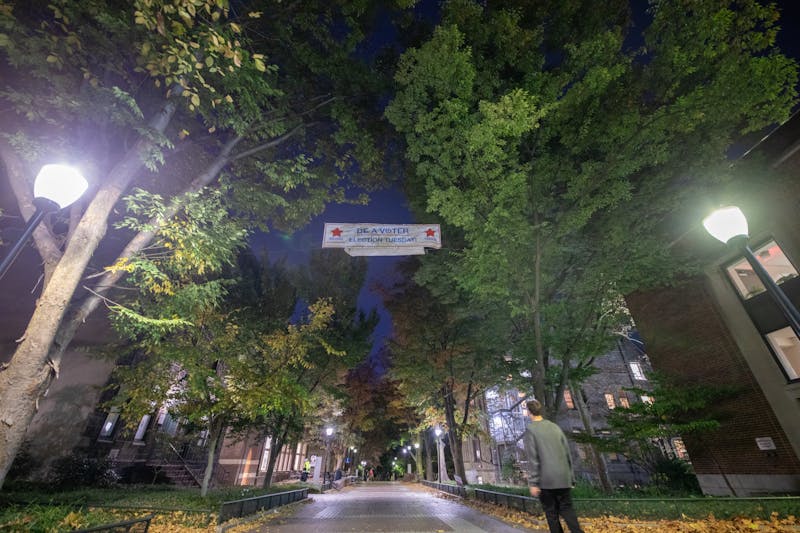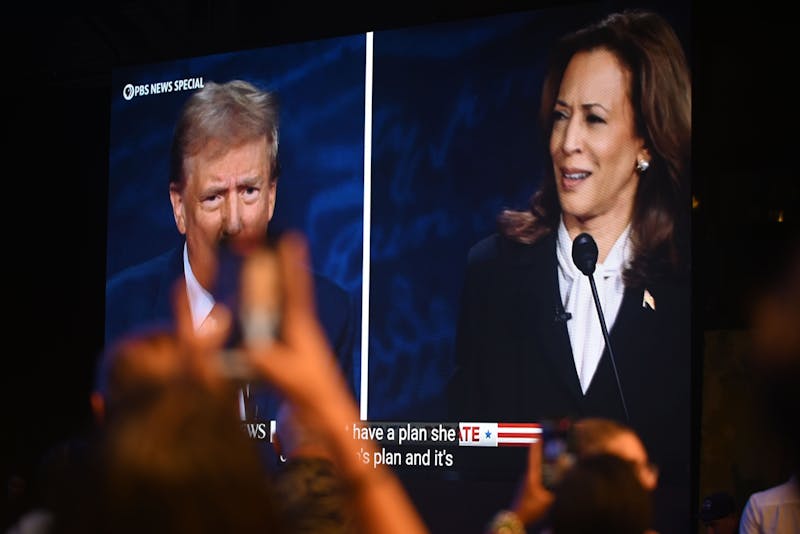
1968 Wharton graduate Donald Trump was elected the 47th president of the United States.
Fox News first called the election for the Penn graduate and former president around 1:50 a.m. on Nov. 6, declaring Trump the victor of the 2024 presidential election, defeating Vice President Kamala Harris in a highly anticipated election to clinch his second term in office. At around 5:30 a.m., NBC News and other outlets called the race after projecting Trump to win Wisconsin, securing the electoral votes to exceed the 270 threshold and win his bid for the White House.
Trump is currently projected to win the national popular vote by 1.5%. Trump was also the projected winner of Pennsylvania, and he declared victory in a speech around 2:30 a.m. at his Mar-a-Lago Club election watch party in Palm Beach, Fla.
Trump said that he had won the national popular vote — though a popular vote winner has not been projected by major outlets — and that Republicans would take control of the House of Representatives and the United States Senate. While all major news networks have projected Republican control of the U.S. Senate, control of the House remains in flux.
This year’s campaign is Trump’s third for president. He first defeated former Secretary of State Hillary Clinton in 2016 and lost to current President and former Benjamin Franklin Presidential Practice Professor Joe Biden in the 2020 contest.
Trump’s victory puts an end to four years of Democratic Party leadership in the White House. President Biden’s approval ratings have been underwater for much of his term, with concerns about the president’s age contributing to Biden’s concession of the Democratic Party nomination to Harris on July 21.
Trump will become the first felon to serve as president, and the second president in American history to serve nonconsecutive terms after Grover Cleveland in the late 19th century.
Sen. JD Vance (R-Ohio), Trump’s running mate, was also elected as vice president of the United States.
After refusing to concede Biden’s victory in 2020 and inciting the Jan. 6, 2021 riot at the Capitol, Trump again made unfounded claims of fraud during this year’s election. On Tuesday, Trump alleged on Truth Social that there was “a lot of talk about massive cheating in Philadelphia” and that “law enforcement [was] coming” — a claim which was widely denounced by officials, including Philadelphia District Attorney Larry Krasner and the Philadelphia Police Department.
On the campaign trail, Trump heavily focused on immigration, the economy, and election integrity. He and his campaign team have stated that his administration will execute mass deportation plans and increase tariffs on imported goods, specifically from China. In the final days of his campaign, his rally at Madison Square Garden made headlines for discriminatory comments made by speakers at the rally against Puerto Rico and Latinos — which garnered criticism from Penn’s Latinx Coalition.
Trump also overcame a campaign dominated by controversy, including a criminal conviction on 34 felony counts for falsifying business records — marking the first time a former president has been found guilty of a crime. Trump has also found himself subject to dozens of additional criminal charges, two assassination attempts, and two presidential impeachments.
Trump’s victory in Pennsylvania — and clinch of the election — came after both campaigns made a concerted effort to court voters in the Commonwealth. The Commonwealth of Pennsylvania was described by The Brookings Institution as “the presidential election’s most important state.” The state previously led Trump to his 2016 victory and Biden to his 2020 victory.
Penn overwhelmingly cast its ballots for Harris. At the four primary voting locations for Penn students, Harris won 81.6% of the in-person votes from the Penn community relative to Trump’s 16.3%. While turnout at these locations dwarfed that of 2020, the proportion of these voters who cast their ballots for Harris was a decrease from Biden’s 83% in 2020 and Clinton’s 91% in 2016.
Harris handily carried Philadelphia County, where Penn is located, with 79% of the vote in the more than 95% of precincts reporting. Philadelphia’s suburban counties were strongly contested and touted to play a decisive role in the election, with both the Harris and Trump campaigns making frequent stops in the region leading up to the election.
Both campaigns have rallied exclusively in swing states in the weeks leading up to the election.
At one of Harris’ final rallies before the election, Philadelphia Mayor and 2016 Fels Institute of Government graduate Cherelle Parker said that “the road to the White House goes right through the Keystone State.” 1997 College and Wharton graduate Elon Musk has also made headlines in the state surrounding his pro-Trump super PAC’s financial donations to Pennsylvania voters.
Trump last campaigned in Philadelphia in June, when he hosted a rally at Temple University’s Liacouras Center. Much of his campaign’s activity in Pennsylvania is concentrated in the western side of the state and rural areas, where his base lies. He spent part of his last campaign day before polls opened on Tuesday in Reading, Pa. and Pittsburgh.
Penn has also risen to national prominence during this year’s campaign season. The University has been cited in the context of Trump and Biden, particularly the analyses by the Penn Wharton Budget Model discussing Trump’s and Harris’ potential effects on the federal deficit and economic growth and controversies throughout the past year related to alleged antisemitism on campus and congressional scrutiny.
While Trump is Penn’s first presidential alumnus, the University has historically been reluctant to make the connection. Trump has also slowly distanced himself from Penn in his 2024 campaign, though he and his family have historically had strong ties to Penn beyond just his alumnus status — several of his children also attended Penn, and he has possibly donated more than $1 million to the University.
The Penn community and the greater Philadelphia community have been heavily involved in the 2024 election, with numerous celebrity appearances on campus to encourage turnout and greater political action and participation on campus.
The Daily Pennsylvanian is an independent, student-run newspaper. Please consider making a donation to support the coverage that shapes the University. Your generosity ensures a future of strong journalism at Penn.
Donate




